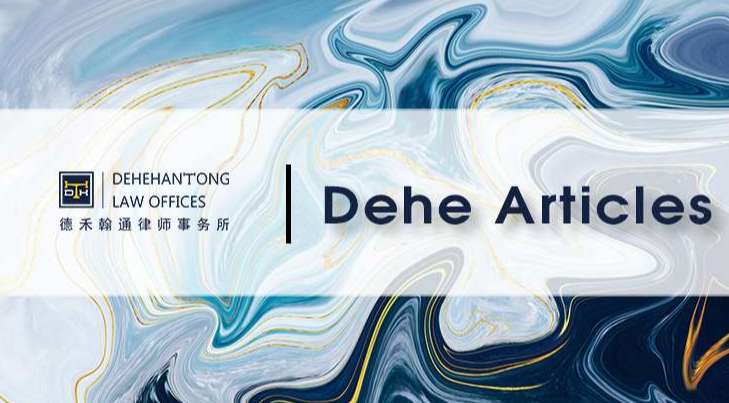An analysis of founder's personal repurchase responsibility under the buyback wave
In equity financing transactions, the valuation clause and the buyback clause are usually the "must" for the startup company and the investment institution. The valuation clause is often determined after several rounds of negotiations between the two sides, and the buyback clause is also clear about the specific buyback arrangement after several rounds of negotiations between the two sides and the legal team.
In the process of serving the equity financing of enterprises, many founders have asked lawyers: If the investor decides to buy back, how to understand the founder's personal buyback responsibility, and whether it may affect the founder's personal property?
On the above questions, the author from the following aspects to answer and analysis.
Whether the founder faces the buyback responsibility?
The author refers to the founder, including both the founder of the individual business, also includes several co-founders of the situation, this article is uniformly referred to as the founder.
For the founder, whether the repo obligor includes the founder has a direct impact on his personal repurchase responsibility, which determines the time point when the founder faces the repurchase responsibility. The author analyzes several common types of buyback terms.
Type 1: The repurchase clause provides that in the event of any repurchase, the investor has the right to require the target company and/or the founder to redeem all or part of the investor's interest in the company.
In this case, the founder is the repo obligor, so the founder is "duty-bound" and should bear the responsibility for repurchase in accordance with the contract.
The second type: the repurchase terms stipulate that in case of any repurchase event, the target company shall redeem all or part of the equity held in the company by the investor, and the founder shall bear joint and several liability.
In this case, the founder bears the guarantee liability. From the analysis of the guarantee legal relationship, the guarantee contract obligation is subordinate, that is, the prerequisite for the performance of the guarantee contract obligation is that the conditions for the performance of the main contract obligation have been fulfilled, while the company should complete the capital reduction procedure when it performs the buyback obligation. If the company has not completed the capital reduction procedure, the conditions for the performance of the main contract obligation of the share repurchase obligation have not been fulfilled. Therefore, the founder has not fulfilled the conditions of the guarantee obligation. As a result, the founder's personal repurchase liability has a defense position, which is why such clauses are less common in transaction documents and investors are less likely to accept such clauses.
The third type: the repurchase terms stipulate that in case of any repurchase event, the target company shall redeem all or part of its equity held in the company as requested by the investor. If the Target company fails to complete the repurchase obligation within a certain period, the founder agrees to fulfill the repurchase obligation as required by the investor and pay the repurchase funds to the investor.
In this case, before the founder undertakes the personal repurchase responsibility, add the premise of "the target company fails to complete the repurchase obligation within a certain period of time", compared with the first type of clause, the third type of clause is obviously "polite" to the founder, but if the premise clause is realized, the founder still bears the personal repurchase responsibility as a direct obligor.
Will the upper limit of the founder's personal repurchase responsibility be breached?
The upper limit of the buyback liability undertaken by the founder is usually agreed to be "limited to the fair value of the company's equity directly or indirectly held by the founder at that time", and the two sides often dispute the latter half of the sentence except.
The author still analyzes several common types of buyback terms.
Category 1: Notwithstanding the foregoing agreement, if the founder commits fraud or intentional acts to trigger the repurchase, its liability for repurchase is not subject to the foregoing agreement.
In this case, if the investor claims that the personal repurchase liability of the founder exceeds the upper limit, it must be proved that the founder has fraud or intentional behavior to trigger the repurchase, that is, proof 1: the founder has fraud, intentional and other malignant circumstances; Proof 2: There is a causal relationship between the founder's fraud and intentional malignancy and the trigger of buyback. For example, there are a large number of company and founder statements and warranty clauses in the transaction documents, usually the company/founder statements and warranty clauses are untrue agreed as one of the buyback events, then in this case, such as the company/founder statements and warranty clauses are fraudulent, intentional and other false circumstances, both meet the founder's fraud, intentional and other malignant circumstances. In this way, investors can claim that the founder's personal repurchase liability exceeds the fair value of the company's equity directly or indirectly held by him at that time.
On the other hand, the accuracy of the representations and warranties is particularly important. In the process of serving enterprise equity financing, the author usually confirms the statement and guarantee terms with the founder one by one. If there is any discrepancy, it is suggested to modify it directly in the transaction documents. If there is a minor flaw and the investor does not agree to the amendment, then the company/founder should at least disclose it in the disclosure letter.
The second category: Notwithstanding the foregoing agreement, if the founder's fraud, intentional act, or (major) negligence leading to the company's (major) loss triggers the repurchase, its liability for repurchase is not subject to the foregoing agreement.
Compared with the first type, the second type of clause obviously increases the founder's personal buyback liability, including not only the existence of fraud, intentional acts, but also (major) negligence resulting in (major) losses of the company.
For such terms, the founder can negotiate with the investor from several angles. First, the version given by the investor may not contain the expression "material", such as only writing "negligence caused the loss of the company" is too strict on the founder, and the founder should propose adding the description "material". For example, can the significant loss be linked to the specific amount of loss, such as the loss of more than 10,000 yuan caused by the company? Finally, the founder may inevitably have negligence in the entrepreneurial process, such as the past compliance operation, corporate governance problems, and become the matter of concern and feedback in the listing process, such as the company failed to go public in the end. Even if the founder does not have fraud, intent, etc., whether the founder has (major) negligence resulting in (major) losses of the company will become the focus of dispute between the two sides. Therefore, it is suggested that the founder raise the company's compliance governance to the same height as the company's sustainable development, attach importance to the lawyer's advice in daily operation, and ensure the company's compliance operation.
To its direct or indirect holdings at that time
How to understand "fair value of corporate equity"?
The first half of this sentence, "based on the company's equity directly or indirectly held by the founder at that time", can be interpreted as the combination of the company's equity directly held by the founder and the company's equity indirectly held by the founder (usually the share of the founder's indirect shareholding on the shareholding platform), and the total share of the company's equity held by the founder after penetration (hereinafter referred to as the "final equity"). The final fair value of the equity is the buyback liability that the founder should bear if he does not break the buyback liability ceiling.
So how is "fair value" defined?
If the company has raised capital in the 12 months prior to the repurchase, then the valuation terms in the last 12 months will serve as an important reference basis for the "fair value of the company's equity." If the company does not have financing within 12 months prior to the repurchase, especially when the repurchase event occurs, the company is usually in poor business conditions, such as the company has just obtained financing (excluding rigid repurchase events such as failing to complete the listing within the time limit), the company usually will not have a repurchase event soon. In other words, when a buyback event occurs, the company may have generated a certain period of time from the previous round of financing, then the company's buyback responsibility is the fixed investment of the investor + annual interest, and the founder's buyback responsibility is the fair value of its final equity. If there is no financing situation within a certain period before the buyback, the understanding of fair value has once again become the focus of controversy between founders and investment institutions. The founder may claim that the fair value of the portion is recognized by multiplying the net asset value by the founder's final equity share.
For investors, they can advocate a more favorable equity value evaluation method, but in the case of the company's repurchase event and the deterioration of business conditions, they should exercise the repurchase right in time to avoid the situation that the founder's final equity fair value may continue to depreciate due to the delay in exercising the right.
Recommended Information
-
Case Studies6 Reflections on commercial dispute resolution cases behind case number2024-09-26
-
ArticlesInterpretation of the core terms of the investment Agreement (I) - the right of first refusal and the right of joint sale2024-09-25
-
UpdatesDehehantong successfully warehousing China Communications Shanghai Shipping Bureau Co., LTD2024-09-25
-
ArticlesThe problems and suggestions in the issuance of managerial assets in ABS or REITs2024-09-23
-
Case StudiesDehehantong successfully represented a private equity fund company to deal with a series of disputes over the responsibility of its managers2024-09-20















